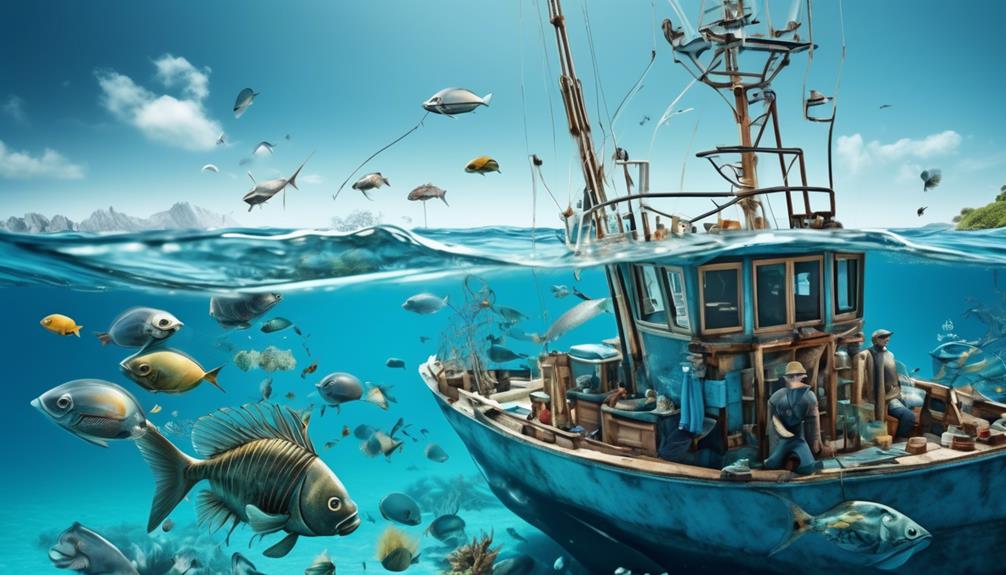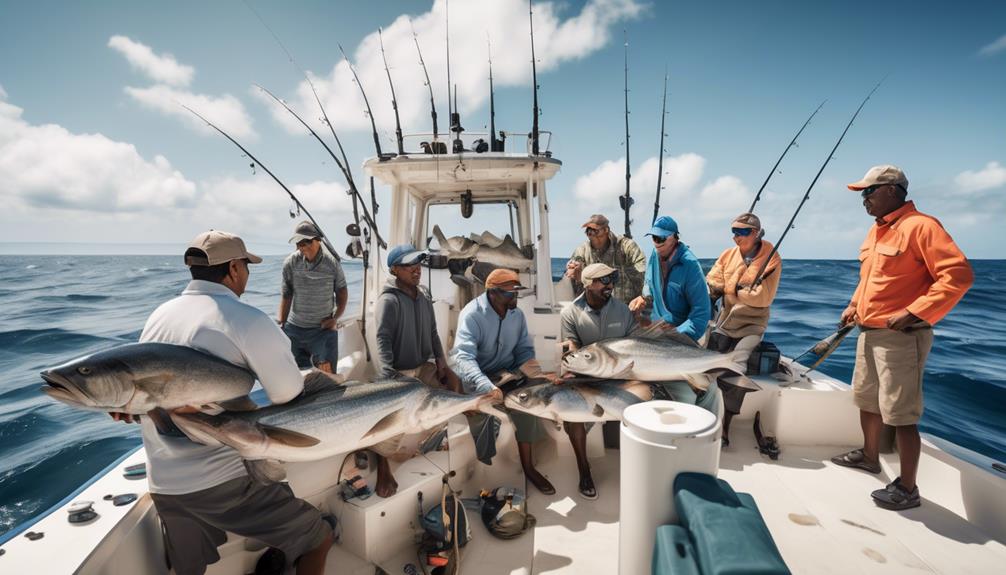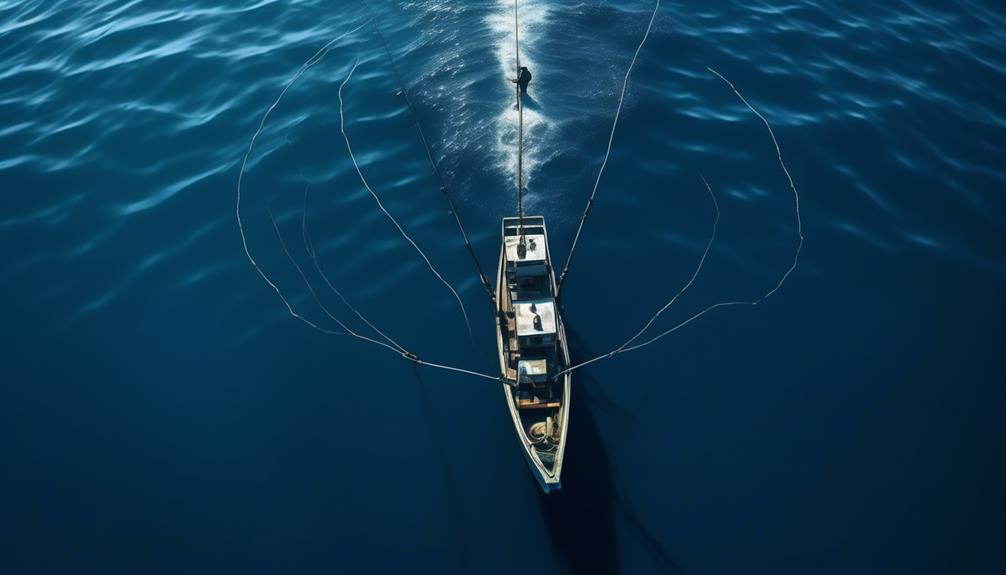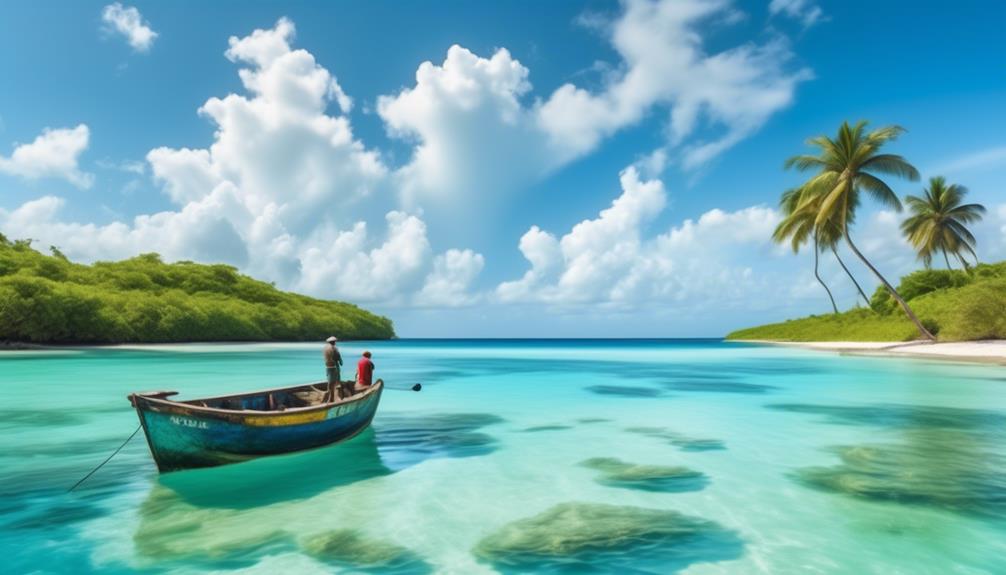Picture a vast, interconnected web of life beneath the ocean's surface, where each species plays a crucial role in maintaining balance and harmony.
Now, imagine the impact of unsustainable deep sea fishing practices on this delicate ecosystem.
With 10 proven sustainable practices, you can help preserve this intricate web while ensuring the future of deep sea fishing.
Each practice is a vital piece of the puzzle, working together to safeguard marine life and secure the livelihood of fishing communities.
Selective Fishing Gear
When using selective fishing gear, prioritize using methods that target specific species while minimizing bycatch. Reducing bycatch is crucial for ecosystem preservation and the long-term sustainability of deep sea fishing. By employing selective fishing gear, such as circle hooks and fish traps, you can actively reduce the unintended capture of non-targeted species. These gears are designed to catch a specific type of fish while allowing others to escape or be easily released, thereby minimizing the impact on non-targeted species.
Additionally, employing techniques like using acoustic alarms on fishing nets can deter marine mammals and non-targeted species, significantly reducing bycatch. This simple addition to fishing gear has shown promising results in preserving the delicate balance of the marine ecosystem.
Furthermore, embracing innovations like turtle excluder devices (TEDs) in trawl nets can greatly contribute to reducing bycatch. TEDs provide an escape route for sea turtles, allowing them to avoid being entangled in the nets. By integrating these devices into your fishing practices, you actively partake in the preservation of marine biodiversity.
Regulated Catch Limits
To ensure the long-term sustainability of deep sea fishing, it's essential to establish regulated catch limits that build upon the reduction of bycatch achieved through selective fishing gear and other innovative techniques. Regulated catch limits play a crucial role in preventing overfishing, preserving fish populations, and maintaining the ecological balance of the ocean. By implementing strict quotas on the amount of fish that can be harvested, we can help replenish fish stocks and ensure that future generations can continue to benefit from the ocean's resources.
- Monitoring Technology: Utilizing advanced monitoring technology such as satellite tracking and underwater drones enables real-time data collection on fish populations and fishing activities. This information is vital for setting accurate catch limits and adjusting them as needed to prevent overexploitation.
- Economic Impact: Regulated catch limits also have a significant economic impact. While some may argue that strict quotas can hinder profitability, they're essential for the long-term viability of the fishing industry. By preventing overfishing, regulated catch limits help maintain stable fish populations, which in turn ensures a consistent supply of fish for commercial purposes.
- Ecosystem Preservation: In addition to directly impacting fish populations, regulated catch limits also contribute to the overall preservation of marine ecosystems. By preventing the depletion of certain fish species, we can maintain the delicate balance of the ocean's food web and protect other marine species that depend on these fish for survival.
Implementing and enforcing regulated catch limits is a critical step towards ensuring the sustainability of deep sea fishing and the preservation of our oceans for future generations.
Protection of Endangered Species
Are you aware of the measures being taken to protect endangered species in deep sea fishing?
In an effort to safeguard vulnerable marine life, marine sanctuaries have been established in various deep sea fishing regions. These protected areas serve as havens for endangered species, providing them with a safe environment where they can thrive without the threat of fishing activities. By designating specific zones as marine sanctuaries, authorities aim to limit the impact of deep sea fishing on endangered species and their habitats.
Endangered species conservation is a crucial aspect of sustainable deep sea fishing practices. Fishing within marine sanctuaries is either heavily restricted or completely prohibited, allowing populations of endangered species to recover and maintain balanced ecosystems. Additionally, measures such as using specialized fishing gear and implementing real-time monitoring systems help to minimize accidental catch or bycatch of endangered species. This proactive approach not only protects vulnerable marine life but also contributes to the overall health and resilience of deep sea ecosystems.
Furthermore, collaboration between fishermen, scientists, and conservationists is vital for the success of endangered species conservation in deep sea fishing. By sharing knowledge and implementing best practices, stakeholders can work together to ensure that endangered species are adequately protected while still allowing for sustainable fishing practices. It's essential for the long-term viability of deep sea fishing that these conservation efforts continue to evolve and adapt to the changing needs of endangered species and their habitats.
Minimizing Bycatch
One effective method for minimizing bycatch in deep sea fishing is through the use of specialized fishing gear designed to target specific species while reducing accidental catch. By utilizing gear such as circle hooks, fish excluder devices, and acoustic deterrent devices, you can significantly reduce the unintentional capture of non-target species.
- Circle Hooks: These hooks are designed to reduce the likelihood of catching non-target species, such as sea turtles and seabirds, by hooking the fish in the mouth rather than the gut. This simple modification to fishing gear has been shown to greatly decrease bycatch rates.
- Fish Excluder Devices: These devices are installed on fishing nets to allow smaller non-target species to escape while retaining the desired catch. By incorporating these into the fishing gear, you can effectively reduce the amount of bycatch without compromising the targeted species.
- Acoustic Deterrent Devices: By emitting sound waves that are aversive to certain non-target species, these devices can help deter marine mammals and reduce their interaction with fishing gear. This innovative technology provides a non-lethal method for minimizing bycatch and protecting vulnerable species.
Implementing these bycatch mitigation techniques not only helps in reducing discards and preserving marine biodiversity but also contributes to the sustainability of deep sea fishing practices. By being mindful of the impact of your fishing activities, you can play a crucial role in promoting sustainable and responsible fishing practices.
Responsible Waste Disposal
Considering the impact of deep sea fishing activities, responsible waste disposal is crucial for minimizing environmental harm and promoting sustainable practices. Waste management and recycling initiatives play a significant role in reducing the negative impact of deep sea fishing on the environment.
Proper waste disposal is essential in preventing ocean pollution and ensuring the health of marine ecosystems.
Effective waste management on deep sea fishing vessels involves separating different types of waste, such as plastic, metal, and organic waste, for recycling or safe disposal. Implementing recycling initiatives onboard can significantly reduce the amount of waste that ends up in the ocean. By properly managing and disposing of waste, deep sea fishing operations can minimize their environmental footprint and contribute to the preservation of ocean ecosystems.
Moreover, preventing ocean pollution is a critical aspect of responsible waste disposal in deep sea fishing. Improperly discarded waste, such as plastic packaging, fishing gear, and other debris, can have detrimental effects on marine life and habitats. Proper waste disposal practices, including reducing single-use plastics, reusing and recycling materials, and adhering to strict waste management protocols, are essential for preventing pollution and protecting the marine environment.
Support Local Fishing Communities
Supporting local fishing communities is vital for fostering sustainable fishing practices and ensuring the economic well-being of coastal areas. By actively engaging with local fishing communities, you can contribute to the preservation of traditional fishing practices and help sustain the livelihoods of those who depend on the ocean for their income.
- Community Engagement: Building strong relationships with local fishing communities fosters a sense of shared responsibility for sustainable fishing practices. Engage with fishermen and community leaders to understand their needs and challenges, and collaborate on solutions that benefit both the environment and the community.
- Economic Impact: Supporting local fishing communities directly impacts the economic prosperity of coastal areas. By purchasing seafood from local fishermen or participating in community-supported fisheries, you can help ensure a steady income for fishing families and contribute to the overall economic stability of the region.
- Preservation of Culture: Local fishing communities often have rich cultural traditions and knowledge passed down through generations. By supporting these communities, you contribute to the preservation of cultural heritage and help maintain the unique identities of coastal regions.
Adherence to Seasonal Fishing
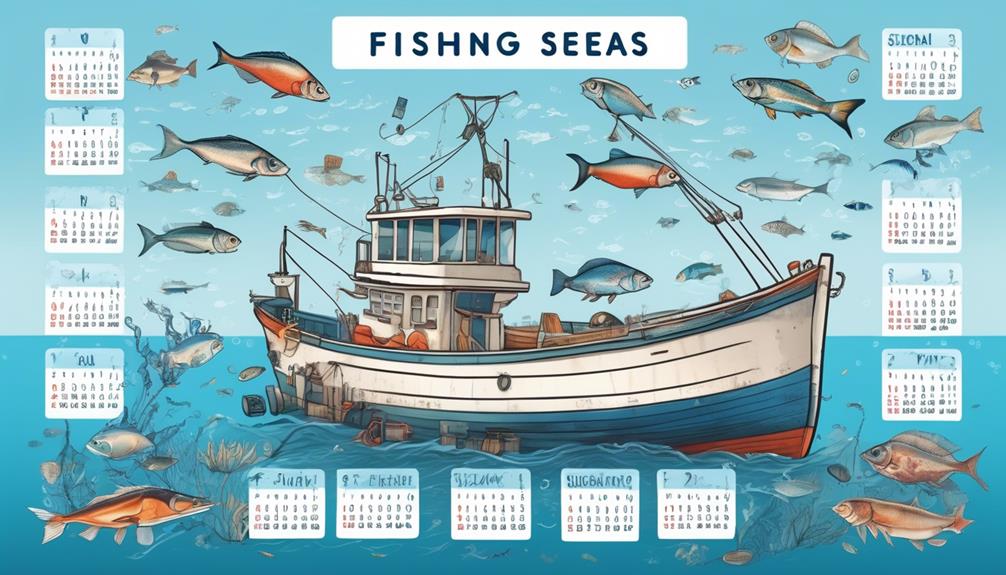
To ensure sustainable practices for deep sea fishing, it's essential to adhere to seasonal fishing regulations and guidelines. Adhering to seasonal fishing helps maintain the balance of marine ecosystems and preserves fish populations. Fishing migration patterns are closely tied to seasonal changes in water temperature, currents, and food availability. When fishing occurs in alignment with these patterns, it reduces the pressure on specific fish populations and allows them to reproduce and replenish their numbers during favorable seasons.
Failing to adhere to seasonal fishing regulations can have a significant environmental impact. For instance, catching certain species during their spawning seasons can lead to a decline in their population, disrupting the natural balance of the marine ecosystem. Additionally, harvesting fish when they're in migration can result in a decrease in their numbers, affecting not only the targeted species but also the predators and prey that rely on them for sustenance.
Conservation of Habitats
By protecting and preserving vital habitats, deep sea fishing can be carried out in a sustainable manner, ensuring the long-term health of marine ecosystems. Ecosystem preservation is crucial in maintaining the delicate balance of the deep sea environment. It involves safeguarding the diverse habitats such as coral reefs, seagrass beds, and deep-sea canyons that serve as essential breeding and feeding grounds for numerous marine species.
Habitat restoration efforts are equally important in repairing any damage caused by human activities or natural disasters, aiming to revitalize and maintain the health of these critical ecosystems for future generations.
Sustainable fishing practices play a significant role in preserving habitats and promoting marine biodiversity. By implementing measures such as reducing bycatch, minimizing habitat destruction, and avoiding overfishing, the long-term health of deep sea habitats can be safeguarded while supporting the abundance of marine life.
Marine biodiversity flourishes in well-preserved habitats, showcasing the interconnectedness of various species within the ecosystem. Protecting these habitats ensures the survival of diverse marine organisms and contributes to the overall resilience of the deep sea ecosystem, ultimately benefiting both the environment and the fishing industry.
Engaging in collaborative efforts with local communities, environmental organizations, and governmental bodies is essential for the effective conservation of habitats. By fostering partnerships and raising awareness about the significance of habitat preservation, sustainable practices can be reinforced, paving the way for a healthier and more resilient deep sea environment.
Frequently Asked Questions
How Do Deep Sea Fishing Practices Impact the Overall Marine Ecosystem?
When deep sea fishing practices are unsustainable, they can cause significant harm to the overall marine ecosystem. Impact assessments are crucial to understand and mitigate these effects, ensuring the conservation of the delicate balance within the ecosystem.
What Measures Are in Place to Ensure the Ethical Treatment of Fish During the Deep Sea Fishing Process?
When deep sea fishing, it's crucial to prioritize fish welfare and ethical treatment. Sustainable fishing practices and proper catch handling are key. Following fishing ethics helps ensure the well-being of fish and the overall marine ecosystem.
How Does Deep Sea Fishing Contribute to Local Economies and Communities?
Deep sea fishing has a significant economic impact on local communities by providing jobs, supporting businesses, and attracting tourism. This contributes to community development by fostering livelihoods and supporting the local economy.
What Role Do Technology and Innovation Play in Promoting Sustainable Deep Sea Fishing Practices?
Technology and innovation are crucial for promoting sustainable deep sea fishing practices. They enable more efficient and selective fishing methods, reduce bycatch, and minimize environmental impact. Embracing these advancements is essential for the industry's future.
What Are the Long-Term Implications of Sustainable Deep Sea Fishing on Future Generations and the Environment?
When you consider sustainable deep sea fishing, it's crucial to think about the long-term implications on future generations and the environment. Environmental conservation is key, and the economic impact must also be carefully managed.
Conclusion
In conclusion, by implementing sustainable practices such as:
- Selective fishing gear
- Regulated catch limits
- Minimizing bycatch
You can help protect the delicate balance of deep sea ecosystems.
It's important to:
- Support local fishing communities
- Adhere to seasonal fishing
To ensure the long-term viability of marine resources.
By prioritizing:
- Conservation of habitats
- Responsible waste disposal
We can all play a part in preserving the health and abundance of our oceans for future generations.
